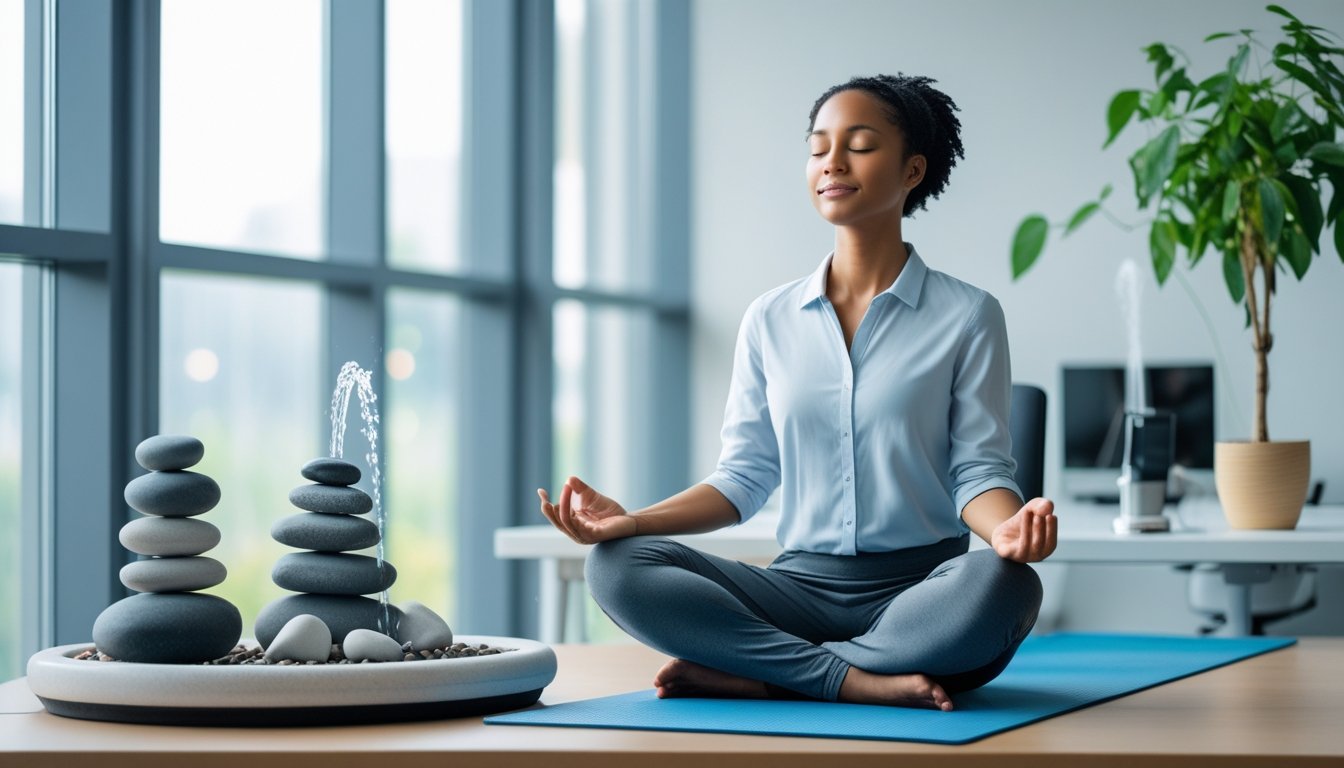Late updated: 01 Jul 2025 09:07
Written by: Ella Thompson
Finding Balance Mindfulness and Recovery: A Guide to Harmonious Living
Embarking on a journey of recovery requires finding the delicate balance between mental, physical, and emotional well-being. In our quest for equilibrium, mindfulness emerges as a powerful ally. By fostering self-awareness and present-moment living, mindfulness can significantly enhance our recovery efforts, providing a stable foundation from which to thrive.

Mindfulness is not merely a practice but a way of living that transforms our perception of recovery. It equips us with tools to navigate life's challenges, allowing us to respond rather than react. This ability to maintain clarity amid chaos is invaluable, empowering us to manage stress and slip-ups effectively.
Our exploration will delve into practical strategies to integrate mindfulness into daily routines. These approaches aim to create a balanced lifestyle, ensuring that recovery is not a constraint but an opportunity for personal growth. Join us as we uncover the key elements that bridge mindfulness and recovery.
Key Takeaways
- Mindfulness enhances recovery by promoting self-awareness.
- It transforms recovery into a journey of growth.
- Practical strategies can integrate mindfulness into daily life.
Core Principles of Mindfulness and Recovery
Exploring core principles of mindfulness and recovery reveals the significance of presence, balance, and emotional resilience in addiction recovery. These elements forge a path towards sustained stability and well-being, fostering an empowered recovery journey.
Understanding Mindfulness in the Recovery Journey
Mindfulness plays a pivotal role in addiction recovery. By focussing on the present moment, individuals can cultivate awareness and acceptance. This practice helps in acknowledging emotions without judgement, which is essential in understanding personal triggers.
Through mindfulness, we nurture a heightened sense of self-awareness. This deepened awareness enables individuals to navigate their recovery journey with clarity and purpose. Presence becomes a cornerstone, allowing the person to engage fully with each step of the recovery process. As such, mindfulness is not just a tool but a foundation for longer-lasting recovery and enhanced emotional well-being.
The Importance of Balance in Recovery
Balance is crucial in maintaining sobriety and emotional stability throughout the recovery journey. Recovery demands a delicate equilibrium between commitments to oneself and responsibilities to others. Striking this balance is vital; it allows for personal growth while maintaining necessary social connections.
In our approach, it is essential to integrate self-care practices alongside external relationships. Achieving this harmony promotes a sense of peace and stability. Acknowledging the importance of balance leads to a healthier, more sustainable recovery process. Mindfulness aids in identifying when balance is disrupted and provides strategies to restore it effectively.
Resilience and Emotional Well-Being
Resilience is the capacity to recover quickly from difficulties, particularly during addiction recovery. Developing emotional resilience aids in overcoming challenges without relapsing into negative patterns. This strength is cultivated through mindfulness, encouraging us to face adversity with courage and composure.
Emotional well-being ties directly into resilience. It empowers individuals by fostering a supportive environment for processing emotions constructively. By strengthening our resilience, we fortify our ability to maintain lasting recovery. Recognising potential setbacks as opportunities for growth enhances both resilience and emotional well-being, ensuring a more robust, enduring recovery journey.
Practical Mindfulness Strategies for Achieving Balance

In our quest to find balance, we can rely on several practical mindfulness strategies. These not only help manage cravings and triggers but also promote self-compassion and personal growth.
Mindfulness Practices for Managing Cravings and Triggers
Managing cravings and triggers is vital in maintaining balance, especially in recovery. We can use mindfulness practices to stay grounded.
Mindfulness exercises, such as meditation and deep breathing, play a significant role. These practices help us become more aware of our cravings and the accompanying emotional turbulence. Breathing exercises calm our mind and trigger the relaxation response.
By focusing on self-awareness and acceptance, we can recognise our triggers and employ effective coping strategies to manage them. Incorporating such mindfulness techniques enables us to confront negative emotions and maintain emotional regulation.
Building Healthy Habits and Daily Routines
Establishing healthy habits and a structured routine can greatly enhance our mental balance. We can prioritise adequate sleep, a balanced diet, and regular exercise to support our well-being.
Including activities such as art and spending time in nature encourages relaxation and creativity. Creating a consistent daily schedule with specific time slots for self-care activities like meditation helps us stay on track.
Engaging in self-reflection ensures our routine aligns with our needs. Setting realistic goals and using SMART goals ensures they are achievable, promoting a sense of accomplishment and personal growth. Emphasising such healthy habits can bolster our overall wellness and resilience.
The Role of Support Systems and Social Connections
Support systems and social connections play a key role in achieving balance. Building a supportive environment through groups such as NA and AA provides essential community and encouragement.
Supportive relationships foster a sense of belonging and offer a platform for shared experiences and advice. We should nurture social connections that promote positive mental health. Joining support groups can facilitate learning through others’ experiences while providing emotional support.
With healthy boundaries, we can navigate friendships effectively, ensuring they contribute to our well-being. Patience and understanding within our support system help us thrive emotionally, strengthening our journey toward stability and peace.
Fostering Self-Compassion and Personal Growth
Self-compassion is integral for personal growth and maintaining balance. By practising self-kindness, we can address our own needs without judgment.
Engaging in self-reflection helps identify areas for growth and improvement. We can explore new hobbies and methods of self-discovery to enhance our skills and maintain good mental health. Compassionate self-talk during challenging times aids emotional regulation and stress reduction.
By setting boundaries, we take steps towards self-care and personal advancement. Overall, commitment to self-compassion and growth ensures that we continually evolve, reinforcing our capacity for finding balance.
Frequently Asked Questions

In our journey towards recovery and balance, mindfulness plays a significant role. Integrating mindfulness with positive psychology and daily practices can enhance well-being.
How can mindfulness practice aid in substance abuse recovery?
Mindfulness can help individuals stay present, reducing cravings by focusing on the moment. This focus can increase self-awareness and promote healthier decisions. By practising mindfulness regularly, those recovering from substance abuse may find it easier to cope with triggers and maintain sobriety.
What are the benefits of incorporating mindfulness into daily life?
Incorporating mindfulness into daily life can lead to reduced stress and increased self-awareness. It can foster a calm and balanced mental state, which can improve overall well-being. Mindfulness practices, such as meditation, can also enhance focus and clarity, benefiting personal and professional areas of life.
Which mindfulness exercises are recommended for managing depression?
Mindfulness exercises like deep breathing and body scans can be particularly helpful for managing depression. These exercises encourage present-moment focus and can interrupt negative thought patterns. Practising them consistently may improve mood and increase emotional resilience.
How does positive psychology integrate with mindfulness techniques?
Positive psychology and mindfulness both aim to enhance well-being. By focusing on positive experiences and strengths, positive psychology complements the self-awareness cultivated through mindfulness. Together, they help individuals build resilience and a more optimistic outlook on life.
What are some effective outdoor activities for practising mindfulness?
Outdoor activities such as hiking, gardening, or simply walking in nature can enhance mindfulness. These activities encourage individuals to engage their senses and remain present in their surroundings. The natural environment itself can provide a calming backdrop for mindfulness practice.
What is the role of mindful movement exercises in enhancing well-being?
Mindful movement exercises, like yoga or tai chi, involve intentional and focused physical movements. These practices promote a connection between the mind and body, enhancing physical health and mental clarity. Incorporating these exercises can lead to improved flexibility, strength, and mental well-being.
